
Mr. Denning Drives North is a 1950 thriller novel by the British-Australian writer Alec Coppel. When successful and happily married aircraft manufacturer Tom Denning attempts to commit suicide by crashing a plane, detectives uncover a murder in his past background that has driven him insane with guilt.
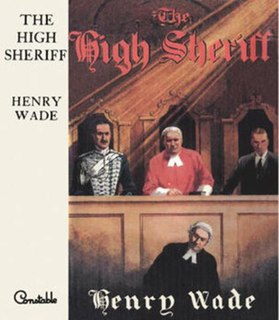
The High Sheriff is a 1937 mystery detective novel by the British writer Henry Wade. Wade was a writer of the Golden Age of Detective Fiction, best known for his series featuring Inspector Poole. This was one of a number of stand-alone novels he wrote, structured as a partially inverted detective story.
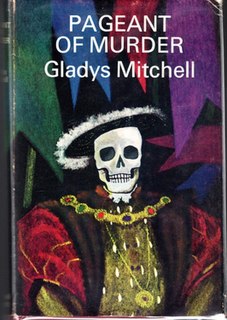
Pageant of Murder is a 1965 mystery detective novel by the British writer Gladys Mitchell. It is the thirty eighth in the long-running series of books featuring Mitchell's best known character, the psychoanalyst and amateur detective Mrs Bradley.

My Bones Will Keep is a 1962 mystery detective novel by the British writer Gladys Mitchell. It is the thirty fifth in the long-running series of books featuring Mitchell's best known character, the psychoanalyst and amateur detective Mrs Bradley.
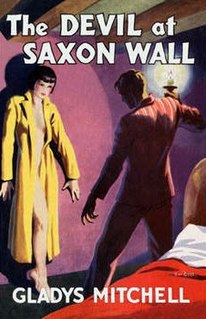
The Devil at Saxon Wall is a 1935 mystery detective novel by the British writer Gladys Mitchell. It is the sixth in her long-running series featuring the psychoanalyst and amateur detective Mrs Bradley. It was the first of a number of her books to feature the theme of witchcraft, the result of hearing a lecture about it from her friend Helen Simpson who she dedicated the novel to.

Your Deal, My Lovely is a 1941 thriller novel by the British writer Peter Cheyney. It is the seventh in his series of novels featuring the FBI agent Lemmy Caution. Much of the action takes place in wartime London. Caution is called in to investigate the disappearance of a prominent scientist.

You'd Be Surprised is a 1940 thriller novel by the British writer Peter Cheyney. It is the sixth in his series of novels featuring the FBI agent Lemmy Caution. Unlike several of the others it has not been adapted for film.
Lynn Brock (1877-1943) was the pseudonym of the Irish writer Alister McAllister, who moved to England and wrote a series of mystery novels. Brock is best known for his series of Colonel Gore detective novels, which enjoyed popularity in the 1920s and 1930s during the Golden Age of Detective Fiction. His novels employ a complexity of style and are generally set in rural locations. He also wrote several plays under the name Anthony Wharton.
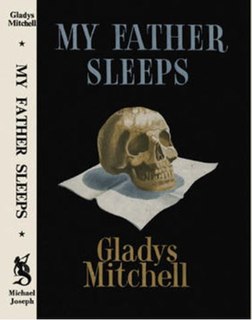
My Father Sleeps is a 1944 mystery detective novel by the British writer Gladys Mitchell. It is the seventeenth in her long-running series featuring the psychoanalyst and amateur detective Mrs Bradley. It is set in the Western Highlands of Scotland.
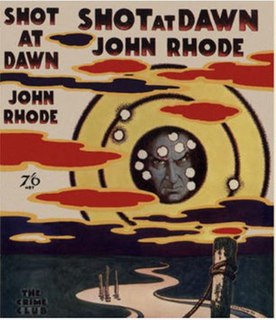
Shot at Dawn is a 1934 detective novel by John Rhode, the pen name of the British writer Cecil Street. It is the nineteenth in his long-running series of novels featuring Lancelot Priestley, a Golden Age armchair detective. It was one of the best received novels in the series. In a review in the Sunday Times Dorothy L. Sayers wrote "Mr. John Rhode is one of those kind, thoughtful writers who patiently explain all the technical points of the narrative in words that a child could understand." Ralph Partridge in the New Statesman observed "Shot At Dawn is developed in that incalculable way which keeps one’s attention at the stretch, until the very last page—I actually got a thrill out of the verdict of the jury! The Crime Club has selected the book, and I certainly could not better their selection from the detective novels that have come my way in the last few months."

A Village Afraid is a 1950 detective novel by the British writer Cecil Street, writing under the pen name of Miles Burton. It was part of a lengthy series of books featuring the detective Desmond Merrion and Inspector Arnold of Scotland Yard.
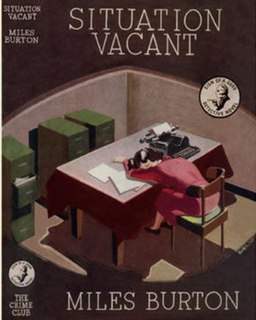
Situation Vacant is a 1946 detective novel by the British writer Cecil Street, writing under the pen name of Miles Burton. It was the thirty fourth entry in a lengthy series of books featuring the detective Desmond Merrion and Inspector Arnold of Scotland Yard. As with much of the series it takes place in rural England.

The Lake House is a 1946 detective novel by John Rhode, the pen name of the British writer Cecil Street. It is the forty second in his long-running series of novels featuring Lancelot Priestley, a Golden Age armchair detective. It was his first novel after returning to his original publisher Geoffrey Bles after all his books between 1931 and 1945 had been published by Collins. His other series featuring Desmond Merrion continued to be released by Collins.

The Murders in Praed Street is a 1928 detective novel by John Rhode, the pen name of the British writer Cecil Street. It features the fourth appearance of the armchair detective Lancelot Priestley, who figured in a long-running series of novels during the Golden Age of Detective Fiction.
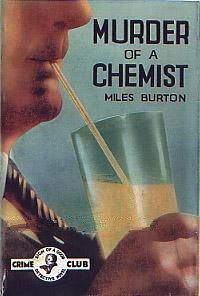
Murder of a Chemist is a 1936 detective novel by the British writer Cecil Street, writing under the pen name of Miles Burton. It is the fourteenth in a series of books featuring the Golden Age amateur detective Desmond Merrion and Inspector Arnold of Scotland Yard.
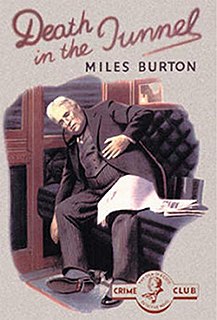
Death in the Tunnel is a 1936 detective novel by the British writer Cecil Street, writing under the pen name of Miles Burton. It is the thirteenth in a series of books featuring the amateur detective Desmond Merrion and Inspector Arnold of Scotland Yard. It was published in the United States by Doubleday the same year under the alternative title Dark is the Tunnel. Originally published by Collins Crime Club, it was reissued in 2016 by the British Library Publishing as part of a group of crime novels from the Golden Age of Detective Fiction. It is part of a subgenre of novels where murders take place on railway lines including the same author's Tragedy on the Line and Dead on the Track
Salute the Toff is a 1941 crime thriller novel by the British writer John Creasey. It is the sixth in his long-running featuring the gentleman amateur detective The Toff.
Harry Martineau is a fictional British police detective created by Maurice Procter. He is a Chief Inspector in the industrial Northern city of Granchester, which was inspired by Manchester. Procter, himself a former police officer, wrote fourteen novels in the series published between 1954 and 1968. Martineau has been described as a transitional figure in detective fiction standing between the Golden Age detectives such as Ngaio Marsh's Roderick Alleyn and Josephine Tey's Inspector Grant and the newer fashion for police procedurals.

Swan Song is a 1947 detective novel by the British writer Edmund Crispin, the fourth in his series featuring the Oxford Don and amateur detective Gervase Fen. It was the first in a new three-book contract the author has signed with his publishers. It received a mixed review from critics.

The Glimpses of the Moon is a 1977 detective novel by the British writer Edmund Crispin. It was the ninth and last novel in his series featuring Gervase Fen, an Oxford professor and amateur detective. Written from the 1960s onwards on publication it was the first novel in the series to be released since The Long Divorce in 1951. The author died the following year and in 1979 a final work Fen Country, a collection of short stories featuring the detective, was publish posthumously.

















